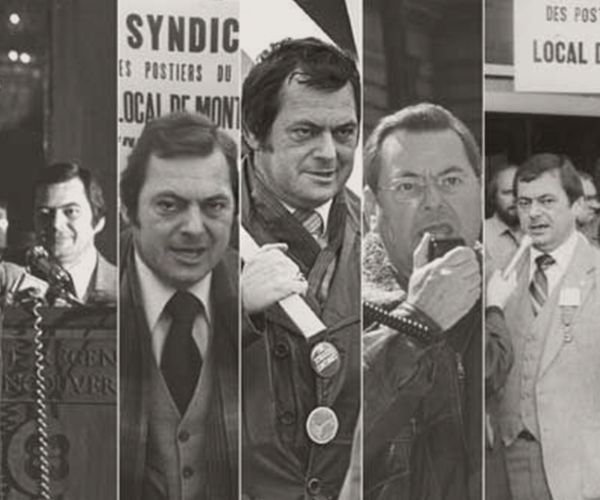
Jean-Claude Parrot, president of the Canadian Union of Postal Workers, is sent to prison
Labour relations between Canada Post and the workers who sort and deliver the mail for people have rarely been good. Between 1965 and 1978, there were seven strikes. A number of those strikes were illegal. In 1974, for example, an illegal strike was what it took to get fair wages for women who operated coder machines, a job dominated by women classified as low pay.
In 1977, the Canadian Union of Postal Workers (CUPW) was ready to negotiate a new collective agreement and was seeking to address a number of issues: the conversion of part-time and overtime hours into full-time jobs, the impact of technological change, working hours and maternity leave. The employer (the federal government), rather than negotiate in good faith, responded with political interference, misinformation and confrontation.
Remember: at this time, Canada Post operated as a department of the federal government, controlled by Parliament and, more directly, by Cabinet and the Minister responsible (the Postmaster-General). It was not until 1981 that it became a Crown Corporation – another longstanding demand of the CUPW – and governed by the Canada Labour Code.
In the summer of 1977, leaked government documents revealed the Trudeau government was working hard to subvert the union by dealing with postal workers directly (divide and conquer!). Workplace union meetings and the distribution of union literature – as allowed in the collective agreement – were banned (the ban was later overturned by an arbitration ruling). Antiquated public sector bargaining rules were reinstated to remove issues from bargaining, including items already in the collective agreement. Under a system where the employer had the power to make, change, and enforce the rules as it pleased, Canada’s postal workers became very frustrated and jaded about their chances of reaching a fair and just collective agreement.
Finally, on October 17, 1978, after 18 months of frustrated negotiations, postal workers across the country walked off the job to start a legal strike. The federal government responded by introducing and passing back-to-work legislation in the House of Commons that same day, ordering an end to the strike. When the law received Royal Assent the following afternoon, the workers refused to comply. CUPW’s president, Jean-Claude Parrot, and the union’s national executive chose to ignore what they saw as an unjust law and refused to order an end to the strike.
Within a week, on October 25, while the union was in meetings with the federal Minister of Labour, the RCMP conducted a raid on CUPW’s offices. Canada Post then declared that it would fire workers who did not return to their jobs, arguing they had abandoned their posts. In order to protect the jobs of its members, the union ended the strike that day, telling workers to return with their heads held high, as negotiations would continue.
Nevertheless, the government had other plans. Two days later, they rounded up the entire CUPW national executive and placed them under arrest. Bail conditions set for Parrot included requiring him to declare an end to the strike that had already ended. In March 1979, a new collective agreement was imposed on postal workers. The next month, after a seven-day trial, a federally appointed judge sentenced Jean-Claude Parrot to three months in jail and 18 months’ probation for defying Parliament.
Parrot reported to jail the following January to begin serving his time – missing the federal election that saw the politicians responsible for his fate returned to power, after having been defeated at the polls shortly after he was sentenced. In jail, Parrot received more than a thousand letters of support from all across Canada, some written by children.
Years later, Parrot would become an Executive Vice-President of the Canadian Labour Congress, representing Canadian workers nationally and internationally as a representative to the International Labour Organization. Since his retirement in 2002, Parrot continues to stand up for the rights of working people. He published his memoires, My Union, My Life, in 2005.